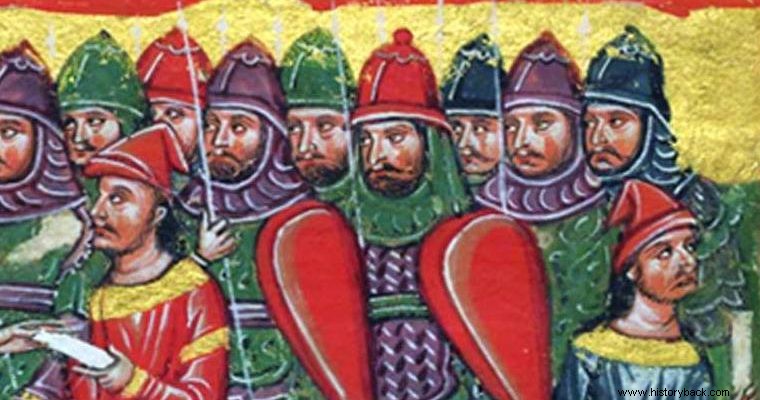
In 1185 the well-known Norman marauders of Sicily who were overseeing the Byzantine Empire attacked, occupied and plundered Thessaloniki. With a base in the second city of the Empire they could easily threaten the capital Constantinople. The city was then ruled by the usurper Andronikos I Komnenos who was dethroned and killed. An incompetent emperor ascended the throne, Isaac II Angelos, who was fortunate enough to have a worthy general at his service, Alexios Vranas.
OF PANTELIS D. KARYKAS
The Normans, after the capture of Thessaloniki, had committed the error of dispersing their forces. Underestimating the Byzantines, whom they did not consider equal to their opponents they sent a body of their own to occupy the region of Strymonas, Serres and Amphipolis. A second body of them moved towards Mosynoupolis with the aim of opening the road to the city, while a third remained in Thessaloniki. The second Norman corps captured Mosynoupolis and secured the springboard to the City. However, the Byzantines had not said their last word.
Imperial counterattack
Alexios Vranas, reinforced with units from Asia Minor, initially moved against Mosinopolis. The Normans who had captured the city came out of it and lined up against the odds confident of their success against the "Griffons" (the dogs of the Greeks, as the said barbarians called us).
However, Vranas defeated them and forced them to close within the walls. Then Vranas rushed against the city. His men burned the gates and entered the city mercilessly slaughtering every Norman , as the latter had done against the Greeks in Thessaloniki and beyond.
After this, the Byzantine general moved against the Norman body that was raiding the wider area of Strymons. The Byzantine army, about whose strength we have no specific information, located the Normans northwest of Serres at the position of Dimitrizi . The historian Nikitas Choniatis , our primary source for the conflict, states that the Normans were led by counts Baldwin and Richard.
The battle at Dimitrizi
The Normans were at first very sure of themselves. However, having been informed of the destruction of their own in Mosynoupolis, it seems that they tried to negotiate with Vranas . The Byzantine general took their intention as a sign of fear and decided to attack them by surprise and with the greatest possible momentum.
Without trumpets or noises, Vranas gave the signal for the attack shortly before nightfall, on November 7, the eve of the Brigades. The Normans were taken completely by surprise and after offering a short resistance their army was dispersed. Many were killed, others fell into the Strymons, most, together with their two generals, were captured by the victorious Byzantines.
"Don't expect war slogan, don't sound a trumpet or what other order of what generals are wont to do before engagements, they attack the wars drawing their swords. And they bravely and courageously threw the Romans and the war took twists and turns.
"Finally, towards they overcame the fervor of the Roman drive, yielding, bowing down and still leaving. Whence they were captured, they were raised, drawn, pushed against the river Strymons, relieved, armed. Leader of the week of November month and about the twilight of the day, so this happened", reports Nikitas Choniatis.
The result
After their disastrous defeat, those Normans who survived fled to Thessaloniki, carrying the message of the calamity. Panicked then they decided to leave Thessaloniki with their ships. So they did, but many of them were lost in the winter Aegean due to bad weather.
Those caught in the city were slaughtered without any mercy from the army of Vranas who, a little later, entered the great Greek city as a liberator. Approximately 4,000 Norman prisoners were sent to the City in irons and spent the rest of their short lives in great pain. The Norman kingdom of Sicily never recovered from this defeat.
